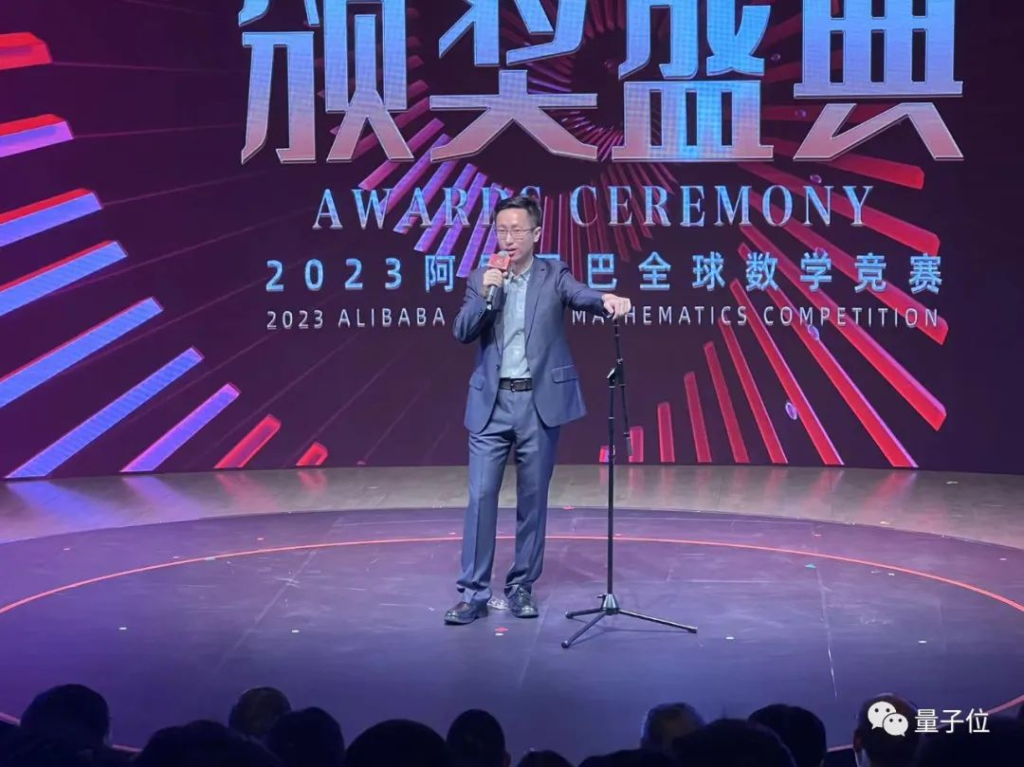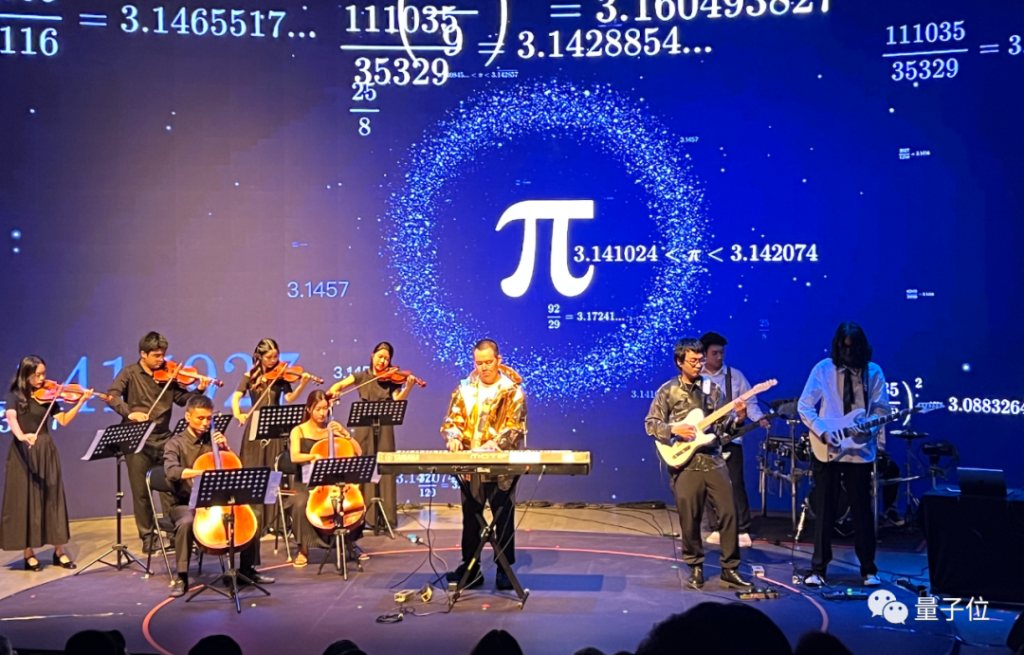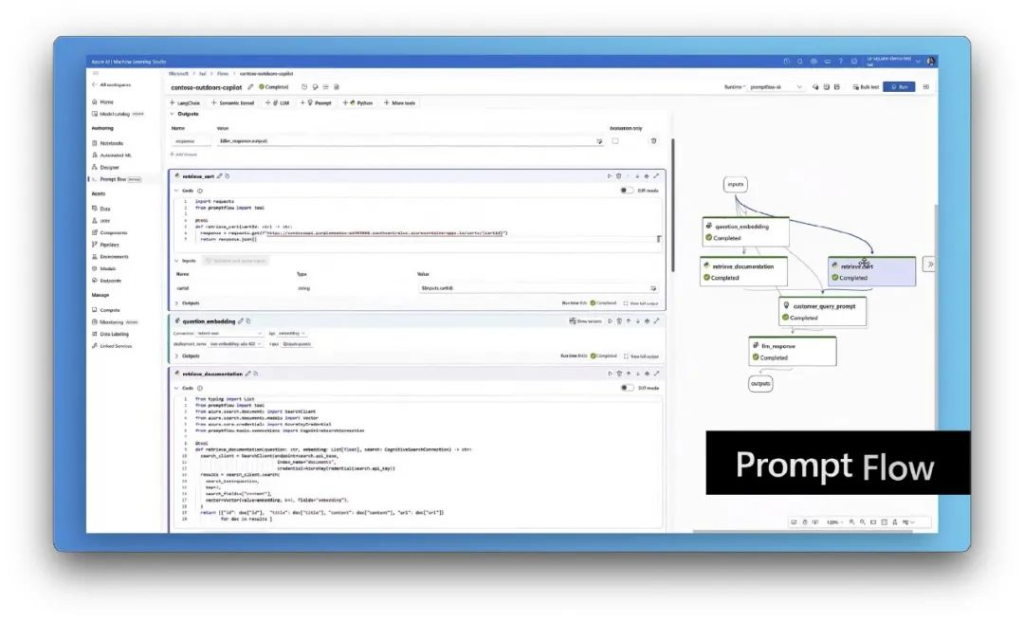Just now, in China’s highest academic institution, another global math frenzy came to an end.
After five months of competition, the Alibaba Math Competition’s strongest four were named:
Their average age is 22. Among them is 17-year-old Chongqing child Qu Xiaoyu, who became the youngest ever gold medal winner and is already a sophomore in the math department at Peking University.
And Zhang Shengtong, a regular visitor to the Ars Electronica competition, finally won gold this year after taking part in the competition four times and winning silver four times. He solved a 70-year-old problem in math during his undergraduate years. His paper was published in the top journal Annals of Mathematics.
Li Xiaoyi and Hao Tianze are both studying at Peking University. One of them, Hao, dazzled a stand-up comedy show directly on the spot.
Pictures
In addition to the above four, there were 66 other contestants who won the Silver, Bronze and Excellence Awards out of 50,000 contestants.
At the awards ceremony, the representative of the winner of the Excellence Award, 20-year-old Lou Yingen with acromegaly, approached the stage.
He is currently studying physics and mathematics at the Massachusetts Institute of Technology (MIT) under the tutelage of Alan Guth, a renowned theoretical physicist and the creator of the burst model of cosmology. His love and optimism for math and even life sparked warm applause.
Photos
The most intuitive feeling of this award ceremony is that more and more young mathematical youths are standing on the stage.
They undoubtedly represent the most promising emerging talents in the field of basic science in the world.
As a matter of fact, in the five consecutive years of Ali Math Contest, more than ten young mathematicians, including Wei Dongyi, have come out of the contest.

This math competition, which is open to all, is becoming a well-known stage for igniting the passion for math, displaying mathematical talent, and unearthing new stars in mathematics.
17-year-old Chongqing kid sets the youngest record
Let’s first take a look at the winners of the contest. There are 4 gold prizes, 6 silver prizes, 10 bronze prizes, and 50 excellence prizes.
Although Peking University occupies half of the country, the performance of other schools is also not bad. For example, Tsinghua, East China Normal and Xi’an Jiaotong University.
There were even winners from middle schools, such as Sun Qi Ao from Shanghai Middle School.
Let’s take a look at how strong these players are next.
Qu Xiaoyu: the youngest ever gold medalist
Qu Xiaoyu is a sophomore mathematics student at Peking University. This is Qu’s second time to participate in the Ali Math Contest. Last year, he won the Excellence Award for his first participation, and was the youngest winner of the competition ever.
Pictures
For Qu, the difference between the two competitions is “”I did eight hours last year and only five and a half hours this year, and this year I’ll be doing all of these topics.””
Last July, still a senior in high school, he represented the national team IMO won a full score of gold medals, and then guaranteed admission to the School of Mathematics of Peking University. Elementary school in the fifth or sixth grade began to read the mathematical analysis on their own, more than two years repeatedly read two or three times.
But even so, he himself confessed that “I am not a genius at all, I am very good at it. The more I learn math, the more I feel I don’t understand too much, I am very small.”
There was also a musical program at the awards ceremony.
Li Yiyi: Undergraduate to senior doctoral level
Also have IMO gold medal experience and 2002 born Li Yiyi, is currently at Peking University basic mathematics read Bo two.
His mentor is Liu Ruochuan, a member of the golden generation, whose research direction is P-advanced number theory, and who will soon enter Princeton University in late October to further his studies on exchange.

Last year, Li was selected for the second Peking University mathematics “Huaixin Bachelor” honorary title. At the time, the faculty said that his mastery of algebraic geometry at the undergraduate level had reached the level of senior doctoral students in algebraic geometry at top American universities.
As early as kindergarten he was able to find his own patterns in multiplying and dividing two- and three-digit numbers, and in junior high school he was delving into high school as well as college math, the report said. In life, Li is a simple man, and math is one of his biggest hobbies.
Hao Tianze: The Sober Segmentalist on Earth
Would you want to be a math expert like Zhang Yitang?
No, no, I would want to be the one who serves them tea and water.
Hao Tianze, who also won the gold medal, defines himself as a “normal type of player”, neither gifted nor hardworking. He is currently in the fifth year of his master’s degree program in basic mathematics at Peking University, with a focus on differential geometry.
Pictures
Looking back on his math journey, he admits: I am optimistic because I accept failure. The more you fail, the more optimistic you become.
My senior year of high school, I wanted to win the CMO Gold Medal, but I ended up winning the Silver Medal. Senior year wanted to make the IMO national team, but ended up not making it. I ran with the first two Ali Math competitions and finally took bronze in 21 years.
Math is a subject that requires accumulation and a lot of digging at the same time. At that time, we talked about love, talked about hard work, and to be able to maintain enough focus on the interest is a very advanced talent.
Participate in the competition in the past few years, his mindset is also quietly changing: mathematics research system is exceptionally large, he believes that it is not necessary to become the top of the person, as long as it can make a small contribution, I feel very satisfied.
Zhang Shengtong: undergraduate broken math 70 years of problems
Zhang Shengtong has been fighting for five years, and when he was 18 years old for the first time, he was going to the United States to study at MIT. As a result, in his freshman year, he joined forces with his team to solve a 70-year-old problem that had been plaguing the mathematical community, and it was published in one of the four major journals of the Mathematical Yearbook.
Image
Today, he has graduated from MIT and is pursuing a PhD at Stanford University. In an earlier public interview, he had threatened to win a Fields Medal for China. But today he laughs and waves his hand: the gap between his work and that of his award-winning predecessors is still too big.
In addition to these green faces, there is also a former god of learning who has returned.
Han Yanjun, the former Tsinghua god of learning, shocked the audience with “15 perfect scores in 20 courses, 4 99 points, a 98 points”. Even though he was guaranteed admission, he took the college entrance exam and became the top science student in Anhui that year (2011).
At that time, because he wanted to do research quietly, so he chose to take the initiative to disappear from the public eye. As a result, he won a silver medal in the Ars Electronica competition.
He is now an assistant professor at the Crown Institute of Mathematics, the Center for Data Science, and the Department of Computer Science at New York University.
Pictures
More than a dozen mathematicians have come out of Asai in five years.
It is worth mentioning that a special debate took place before the award ceremony.
Math enthusiasts from all directions, including courier boys, B station UP masters, and popular rising stars of mathematics, doctoral students of the Department of Mathematics of Peking University, and IMO Olympiad Gold Medalists explored in the Lecture Hall of the Department of Mathematics of Peking University:
Whether AI can replace mathematicians. This is really interesting at a time when big models are hot.
Photo.
The topic of ‘usefulness of math’ was also discussed again.
As a matter of fact, many advances in cutting-edge technologies, such as AI big models, computers, IoT, chips, quantum computing, drones, machine learning, etc., rely on mathematicians.
As one of the oldest subjects, math is the foundation of all disciplines. For example, one of the finalists in this competition is “the connection between a large language model and a formula in mathematics”.
Teachers in the group said that the question itself is not difficult, but they want to express that math is everywhere in life, and can help us understand some complex emerging things that are happening.
And the whole wave of technology, but also need more love of mathematics, with mathematical talent to participate in the talent.
Ali Math Contest, which has been held for many years without any threshold and is open to all people in the world, echoes this demand for talents.
In the past five years, it has also brought real impact:
For one thing, more people pay attention to math, so that math is no longer a carnival for the few. Since 2018 Ali Math Contest has cumulatively attracted 250,000 participants, with contestants covering more than 70 countries and regions.
This year, more than 70% of the participants are popular players, 37,000 people are not math-related majors, and the maximum age of the participants is 67 years old, and the minimum age is 7 years old.
For example, Sun Jinyuan, a 95-year-old courier boy who participated for the first time this time.
After finishing his work every day, he sets aside an hour or two to delve into math, and he once spent two weeks proving the Euler constant formula.
Image
Secondly, more young scientists are unearthed. In the five years since the Ali Math Contest was held, more than a dozen young scientists have come out of it.
For example, Su Weijie, an associate professor at the University of Pennsylvania, was the first silver medalist.
Now engaged in research at the intersection of mathematics and computing, he has won the Sloan Prize and the first SIAM Young Prize in Data Science, based on his significant contributions to optimization algorithms for machine learning, data privacy protection, the theoretical foundations of deep learning, and high-dimensional statistics.
Image.
His work on convex optimization acceleration algorithms was featured in a large section of a 1-hour presentation at the International Congress of Mathematicians by machine learning titan Michael Jordan.
Mingtao Xia, the 2021 Silver Medalist, graduated from Peking University and went to UCLA to pursue a PhD in applications, and is now an assistant professor at New York University.
Xia also has a hidden identity as an “uploader”. He does not have many followers on the B website, but he insists on sharing his thoughts on mathematical modeling and computation. In June this year, he graduated from UCLA with a PhD, and with the consent and support of his teachers, he live-streamed his PhD thesis defense on B-site:
“I hope that through online promotion and teaching, I can inspire more people’s passion and interest in math in a more popular language.”
Pictures.
2020, 2021 Gold Medalist Born in 1994, Wang Donghao came to SUNY Stony Brook after graduating from MIT and is now an assistant professor at the Simons Center for Geometric Physics.
……
Such competition awards that tap young scientists are actually not uncommon. For example, like the domestic Green and Orange Prize and the foreign Sloan Prize.
But a prize like this, which focuses only on mathematics and is open to all people and even to the world with zero threshold, seems to be the only one at present.
As Zhang Yitang said at the beginning of the competition, “I hope that through this global competition, we can awaken the public and society to pay attention to mathematics.”
Tian Gang, president of the Chinese Mathematical Society and academician of the Chinese Academy of Sciences, also said, “Mathematics knows no boundaries, and every year the Ali Math Contest attracts contestants from all over the world. This cross-cultural convergence and exchange not only enriches ideas and methods in the field of mathematics, but also promotes international exchange and cooperation.”
Image
With such a model, more people can embrace math and deepen their commitment to it, in order to truly promote the progress of science and technology from the field of basic science.
This requires a real sense of long-termism, and the five-year Ali Math Contest is just the beginning.
So ‘can AI replace mathematicians’? The answer to the thesis is obvious, AI needs more math workers, AI will help more math workers, and AI may also make more people become math workers.
Just like after AlphaGo, more people started to learn Go and enjoy it through AI guidance?












